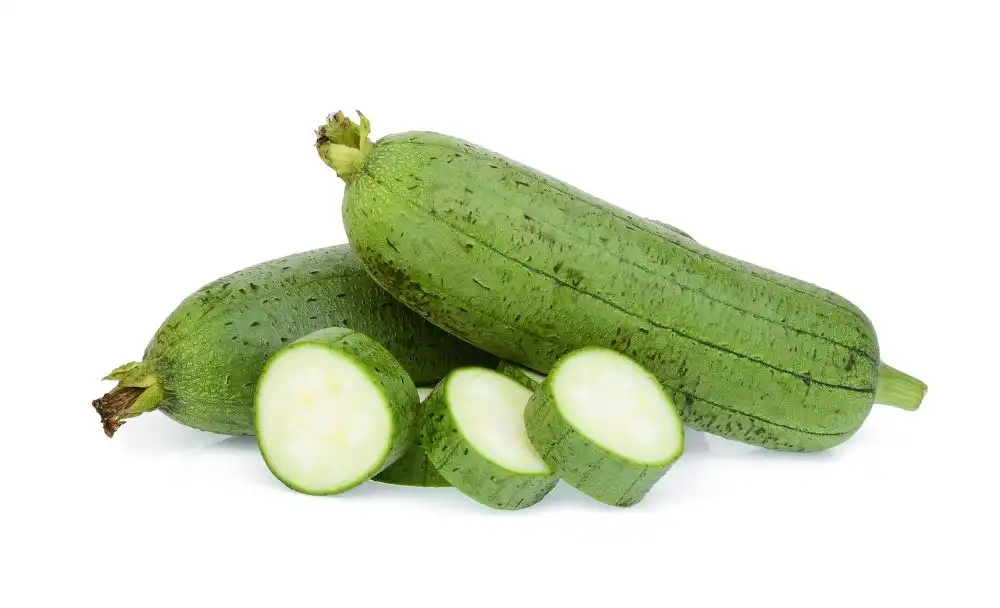
Sponge gourd, scientifically known as Luffa cylindrica, is a versatile vegetable widely used in Ayurveda for its medicinal properties. This article aims to provide an in-depth understanding of sponge gourd, its benefits, uses, nutritional value, potential side effects, and various aspects from an Ayurvedic perspective. By delving into each benefit and its primary and secondary aspects, we will explore the potential of this remarkable vegetable in promoting overall health and well-being.
Benefits of Sponge Gourd [2] [3]
- Digestive Health
Primary Benefit: The high dietary fibre content in sponge gourd promotes optimal digestion and prevents constipation. It adds bulk to the stool, facilitating regular bowel movements.
Secondary Benefit: Additionally, the fibre in the sponge gourd supports the growth of beneficial gut bacteria, aiding in overall gut health and promoting better nutrient absorption.
- Immune System Boost
Primary Benefit: Sponge gourd is a rich source of vitamin C, a powerful antioxidant that boosts the immune system and protects against infections and diseases.
Secondary Benefit: It also contains vitamin A, which supports the immune system and helps maintain healthy skin and mucous membranes.
- Skin Health
Primary Benefit: The presence of antioxidants in sponge gourd, such as vitamin C, helps combat free radicals and protect the skin from oxidative damage. It promotes healthy, radiant skin.
Secondary Benefit: Regular consumption of sponge gourd can improve skin texture, reduce blemishes, and delay the signs of ageing, contributing to a youthful appearance.
- Heart Health
Primary Benefit: Sponge gourd is low in calories, saturated fat, and cholesterol, making it a heart-healthy vegetable. It supports maintaining healthy cholesterol levels and cardiovascular function.
Secondary Benefit: The presence of potassium in the sponge gourd helps regulate blood pressure and promotes overall heart health.
- Nutritional Value
Primary Benefit: Sponge gourd is packed with essential vitamins and minerals. It is a good source of vitamin B6, folate, and potassium, which play crucial roles in various bodily functions.
Secondary Benefit: These nutrients contribute to optimal brain function, support energy metabolism, and assist in maintaining healthy blood pressure levels.
- Weight Management
Primary Benefit: The high fibre content in sponge gourd provides a feeling of fullness and aids in weight management by reducing excessive food intake.
Secondary Benefit: It supports healthy eating habits, prevents overeating, and contributes to maintaining healthy body weight.
- Bone Health
Primary Benefit: Sponge gourd contains essential minerals like calcium, magnesium, and phosphorus, which are vital for maintaining strong bones and teeth.
Secondary Benefit: Regular consumption of sponge gourd can help reduce the risk of osteoporosis and promote skeletal health.
- Eye Health
Primary Benefit: Sponge gourd is rich in beta-carotene, which the body converts into vitamin A. This vitamin is essential for maintaining good vision and eye health.
Secondary Benefit: It helps protect against age-related macular degeneration and other eye-related issues.
Uses of Sponge Gourd [3]
Sponge gourd finds various uses in culinary and traditional medicine practices:
- Culinary Uses
Sponge gourd can be used in curries, stir-fries, soups, and stews to add a unique texture and mild flavour. It can also be stuffed, pickled, or used in salads.
- Skin Care
Dried and powdered sponge gourd can be used as a natural exfoliator to remove dead skin cells and promote smooth, glowing skin.
- Traditional Medicine
In Ayurveda, sponge gourd is used for its cooling properties and is believed to have benefits for digestion, wound healing, and overall well-being.
Nutritional Value of Sponge Gourd [1] [2]
Sponge gourd is a nutrient-dense vegetable that offers various health-promoting compounds:
- Vitamins
It is a good source of vitamin C, vitamin A, vitamin B6, folate, and vitamin K.
- Minerals
Sponge gourd contains minerals like calcium, magnesium, potassium, phosphorus, and iron.
- Antioxidants
It is rich in antioxidants like beta-carotene and vitamin C, which help combat oxidative stress and protect against chronic diseases.
Potential Side Effects [3]
While sponge gourd is generally safe for consumption, some individuals may experience specific side effects:
- Allergic Reactions
People with allergies to cucumbers, melons, or other members of the Cucurbitaceae family may also be allergic to sponge gourd.
- Digestive Issues
Excessive consumption of sponge gourd may cause bloating, flatulence, or diarrhoea in some individuals due to its high fibre content.
It is always advisable to consume sponge gourd in moderation and consult a healthcare professional if you have any specific concerns or medical conditions.
Conclusion
Sponge gourd, with its diverse range of benefits, nutritional value, and culinary uses, holds significant potential for promoting overall health and well-being. From supporting digestion and boosting the immune system to enhancing skin health and aiding in weight management, this vegetable has much to offer. However, it is essential to consume it in moderation and consider individual allergies or sensitivities. Incorporate sponge gourd into your diet and experience the goodness it brings for yourself.
Frequently Asked Questions (FAQs)
1. Can sponge gourd be consumed raw?
Yes, sponge gourd can be consumed raw in salads or as a snack.
2. What is the best way to cook sponge gourd?
Sponge gourd can be cooked by stir-frying, boiling, or steaming, depending on the desired recipe.
3. Can sponge gourd help in managing diabetes?
Yes, sponge gourd has a low glycemic index and can be included in a balanced diabetic diet. However, it’s important to monitor overall carbohydrate intake.
4. Can sponge gourd be grown at home?
Yes, sponge gourd can be grown in home gardens or containers with proper care and adequate sunlight.
5. Is sponge gourd beneficial for hair health?
Yes, sponge gourd is believed to promote hair growth and improve the overall health of the scalp when used externally.


















